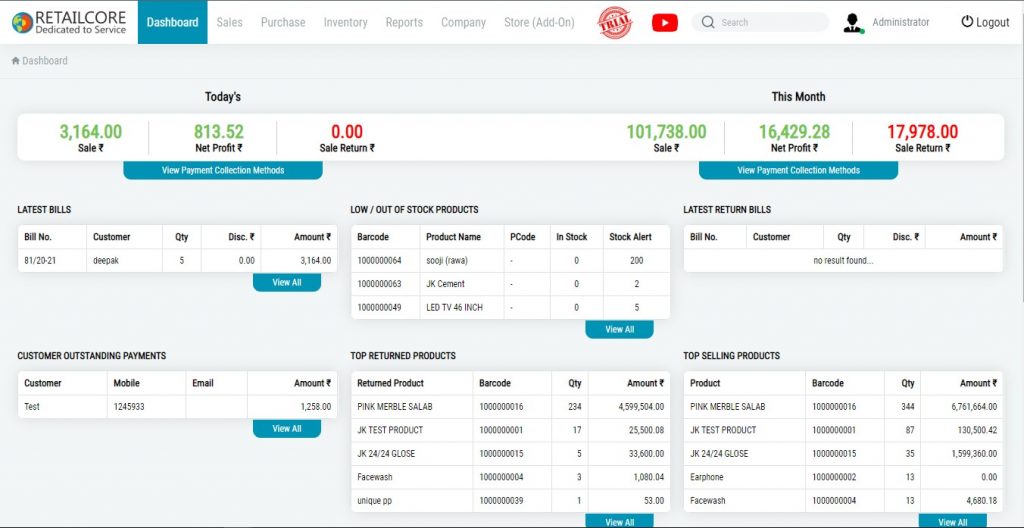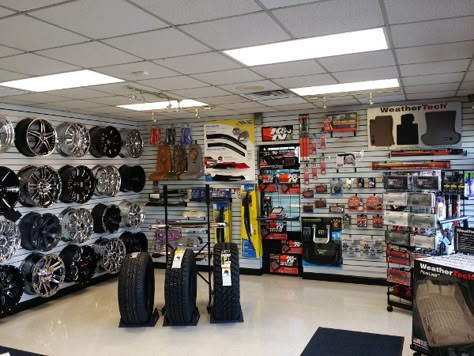Here’s a simple explanation of various retail operations you can manage with RetailCore Software:
Purchase inward from supplier:
This refers to receiving the products or goods from the supplier into the retail store’s inventory.
Purchase order:
It is a document created by the retailer to request the supplier to provide certain products at a specified price and quantity.
Stock inward:
It means adding new products to the inventory when they arrive from the supplier.
Debit note:
It is a document used when there is a discrepancy in the received goods or if there are any damaged or missing items. The retailer notifies the supplier about the issue and requests appropriate adjustments or refunds.
Barcode:
It is a unique code represented by vertical lines that are scanned at the point of sale (POS) to identify a product quickly. It helps in tracking inventory and speeding up the billing process.
Inventory management:
It involves tracking and controlling the stock of products in the store. It includes activities like stock monitoring, reordering, and ensuring adequate availability of products.
Warehouse:
It is a large storage facility where retailers keep their inventory before it is sent to stores. It serves as a central location for storing and managing stock.
FIFO and LIFO in inventory:
FIFO (First In, First Out) and LIFO (Last In, First Out) are methods used to manage inventory. FIFO means that the oldest products are sold first, while LIFO means the newest products are sold first.
Low stock alert:
It is a notification or warning system that alerts the retailer when the stock of a particular product is running low. This helps them to reorder the products in time to avoid stockouts.
Minimum order quantity:
It is the minimum quantity of a product that a retailer must order from the supplier to fulfill an order. Suppliers may set this requirement to ensure cost-effectiveness in production or shipping.
Billing to customer with POS:
POS (Point of Sale) refers to the system or software used to complete transactions at the retail store. It calculates the total amount for the purchased items, applies any discounts or taxes, and generates a bill for the customer.
Sales return:
When a customer wants to return a purchased product, it is called a sales return. This could be due to reasons like a defect, dissatisfaction, or wrong item received.
Credit note:
A credit note is a document issued by the retailer to provide a refund or credit to the customer for returned goods. It serves as a record of the transaction and the amount credited.
GST tax:
GST (Goods and Services Tax) is a consumption-based tax levied on the sale of goods and services. It is a common tax system used in many countries, including India.
CRM (Customer Relationship Management):
CRM is a system or strategy used by retailers to manage their interactions and relationships with customers. It involves collecting customer data, analyzing buying patterns, and implementing personalized marketing and customer service initiatives.
Franchise store:
A franchise store is a retail establishment that operates under a franchise agreement. The store is owned and operated by an individual or business (franchisee) but follows the brand and business model of a larger company (franchisor).
MRP (Maximum Retail Price):
MRP is the highest price set by the manufacturer or supplier for a product. It represents the maximum amount that a retailer can charge the customer for that product.
Offer price:
It refers to a discounted or reduced price offered by the retailer to attract customers. It is usually lower than the MRP and is often a temporary promotion.
Profit margin:
Profit margin is the difference between the selling price of a product and the cost of acquiring or producing it. It represents the profitability of the product or the store.
Net profit:
Net profit is the amount of money left after deducting all expenses (such as inventory, rent, salaries, etc.) from the total revenue generated by the store.
Gross profit:
Gross profit is the total revenue generated by the store minus the cost of goods sold (COGS). It represents the profit made from selling the products before deducting other expenses.
Customer loyalty:
Customer loyalty refers to a customer’s willingness to repeatedly purchase from a particular store or brand. It is built through positive experiences, quality products, excellent customer service, and loyalty programs.
Physical stock audit:
Also known as a physical inventory count is a process of physically counting and verifying the quantity of items in a store or warehouse to ensure it matches the recorded inventory.
Barcode reader or barcode scanner:
A device that scans and interprets the barcode on a product, converting it into a readable format for inventory management or point-of-sale systems.
Thermal printer:
A printer that uses heat to create printed images on specially designed thermal paper, eliminating the need for ink or toner.




